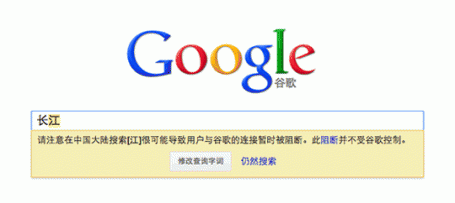According to Greatfire.org, sometime between 5 and 8 December, 2012, Google quietly removed a feature that had informed users from mainland China of censored keywords. The “help article” which explained how to use the feature was also removed. A Google spokesman in Japan confirmed to Bloomberg that the feature has been disabled but declined to comment further.
A number of mainland Chinese netizens have suggested a parallel between Google's change of policy and its new business partnership with Qihoo 360. Since Google stopped abiding by Chinese government censorship demands in the Spring of 2010, some of its major business partners in China have suspended their business relations with it under pressure from the Chinese government. For example Sina Weibo stopped using Google's search engine in March 2011. The recent cooperation between Google and Qihoo 360 is therefore seen by online commentators as a possible shift in Google's business dealings with China.
Qihoo is originally an antivirus software and a web-browser company. In August last year it entered the search engine business in rivalry with Baidu, the biggest search engine in China. The news about the Google-Qihoo partnership was reported in the China Daily and picked up by the Chinese Government's official website on January 7, 2013.
Google's censorship warning feature was introduced in May of 2012 to improve users’ search experience. Since spring 2010, all searches from its mainland Chinese search engine, google.cn, were redirected to its uncensored Hong Kong-based Chinese language search engine, google.hk. However, Google searches made by users in mainland China can still be blocked through the user's Internet service provider by the Chinese government's own online censorship system, known as the Great Fire Wall—a system over which Google has no control.
Because this filtering system results in a connection reset which disrupts the user's Internet connection, the warning box feature was designed to alert mainland Chinese users that the continued search of the sensitive term may break the users’ connection to Google and that the interruption is outside Google's control. The below screenshot shows the image of the warning box feature:

The feature alerted users of a potential disruption to the Internet connection, but as more and more websites and keywords became inaccessible in China, search became increasingly difficult. Sources told Techcrunch that “Google pulled the feature because it was making it more difficult for users to access its search services.” This has been confirmed by another source who requested anonymity, and who says that the decision was taken to improve users’ search experience and data accessibility. When contacted, Google declined to comment.
In Chinese social media, some see this quiet policy change as a compromise in Google's transparency principle. There are also speculation that the move is correlated to the new partnership between Google and Qihoo in the search engine advertisement business, though partnerships of a similar nature have taken place before.
Currently Qihoo's biggest competitor in the search engine advertisement business is Baidu. To protect its interests, Baidu blocks Qihoo's search engine from crawling its content data. Many believe that the competition between the two has brought Qihoo and Google together. The partnership may imply that Google is quietly trying to reenter the Chinese search engine market.
Many Chinese netizens are, however, not happy about the cooperation because of Qihoo's rather controversial business style:
BillBatesCN believes that Google is trying to re-enter China while giving up on its ethical commitments:
Google要借助跟360的合作回归中国,我一直认为谷歌是个很有底线的公司,虽说在中国市场就是要放下身段,但我瞬间觉得谷歌和360少了110。
Google is trying to re-enter China by cooperating with 360 [the brand name of Qihoo's search engine]. I used to believe that Google is a company with an ethical baseline. Though there are inevitable trade-offs in entering the Chinese market, between Google and 360, there are 110 other choices.
He Zhiyong notices the coincidence in the removal of the censorship warning and the cooperation between Google and Qihoo:
近日,国内有消息称奇虎360与谷歌有望达成搜索合作协议。360也 向媒体证实了这一消息属实。与此同时,有报道称,谷歌搜索悄悄撤掉了警示中国网络审查的标语。分析指 出,谷歌搜索彻底在中国失败了,而借助360在中国翻盘的机会也很小,如果360搜索系统成熟,谷歌可能会被抛弃呜呜呜…
There is news that Qihoo 360 has an agreement with Google to forge a business partnership and 360 has confirmed this in the media. At the same time, there is a report that Google has quietly removed the message about censorship of search results in China. Some analysts say that Google has lost the Chinese market completely and the chance to re-establish themselves in China through cooperation with 360 is small. Once the 360 search system is mature, Google will be dumped.
On Sina Weibo, the most influential Chinese domestic micro-blogging platform, there's a lot of talk about the Google-Qihoo cooperation. Many angry remarks [zh] point to Qihoo 360's controversial past business style, such as accusations of faking of a Microsoft patch in August 2012 or Yahoo China's lawsuit back in 2006. The most recent scandal involves an accusation of a privacy breach that involves the leaking of private information of its users on its website, upload.360safe.com.




1 comment